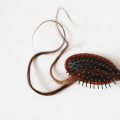It’s funny to think I have to be thankful for a pill that made my hair fall out. My doctor had just prescribed the latest and greatest birth control pill, a magical pill that allowed you to have a period only four times a year.
But what my doctor didn’t bother to find out was that having a period four times a year was something I was used to. It was something I often felt strange about as a young girl, when all of my friends had their menstrual cycles working like clockwork.
About two months into the magical birth control pill, my hair began to fall out. Not a little bit, but in chunks. I was horrified and called my doctor straight away. Her advice? To go on taking the pill because it probably had to do with “something else.” She asked, “are you stressed at work?”
Desperate for answers, I took to the Internet to see what other women were saying. I was shocked when I came across a forum of women talking about their hair loss and Seasonique. One woman said she had been off the pill for years and her hair continued to fall out.
I ignored my doctor’s suggestion and threw the pill in the trash. The next day, I made an appointment with my dermatologist to see what I could do about my hair. A chunk of hair had fallen out in the front and it was embarrassing and scary.
The Dermatologist Diagnosed My Hormone Imbalance
My dermatologist did what my gynecologist should have done: she ran a battery of blood tests right away. Within a day, she called with some news. “We believe the hair loss is caused by alopecia areata,” she said. “It can be brought on by stress but is a hereditary disease.” She prescribed me steroid injections to stimulate the hair growth but then she added something else:
“You also have elevated DHEA levels,” she said. “This is not something to be too concerned about, but I suggest you speak to an endocrinologist or reproductive specialist.”
DHEA? What was that? I thought. But before I could ask, she was gone.
So commenced the journey of being my own doctor, my own counselor, my own pharmacist, and my own biochemist.
Unfortunately, in this world of busy doctors and poor bedside manner, you sometimes have to take the research upon yourself. Leave no stone unturned. Ask questions. Be annoying. It’s your health and you must fight for it.
Here is what I found out: DHEA, or dehydroepiandrosterone, is an important steroid hormone produced by the adrenal glands. It works as a precursor to both male and female sex hormones and therefore helps regulate over 55 hormones in the human body. Healthy DHEA levels are important to maintaining hormone balance in the body.
Still confused by the meaning of this, I called a reproductive health specialist at a clinic for fertility. I was lucky at the time to have excellent insurance, something I know a lot of women do not.
As soon as I talked to the doctors, who would later end up performing endometriosis surgery on me, I was instantly impressed by their care, efficiency, and expertise.
PCOS and Endometriosis
They quickly diagnosed me with PCOS, or polycystic ovarian syndrome. This, they said, was the reason for my increased DHEA, hair loss, and weight gain. Next, they took a detailed history from me. Through this they discovered what they expected to be endometriosis. They recommended laparoscopic surgery to clear out the endometriosis.
This was all so much information for me, and I took a few days to try to process it. My new doctor, an expert surgeon, said something that intrigued me:
“We are seeing an increase of women who have dual diagnosis: PCOS and endometriosis.”
More women with conditions just like me? Why would this be?
My research began with trying to make sense of the two diseases. I underwent surgery for endometriosis in 2011 and then focused on working with my doctor to change eating habits that exacerbate symptoms of PCOS.
But that link still bothered me.
Why would there be more women with the two illnesses? And what was this increased DHEA doing to my health? And what could be causing this increase? Unfortunately, these questions still linger, with many doctors avoiding my questions.
When my treatment for endometriosis was over (they found adhesions on my bladder, uterus, and small intestines), I was left to pick up the pieces of my scarred body. I ignored my doctor’s advice and went off the birth control pill, something I has been taking for 10 years, and commenced on a journey of self discovery and holistic health.
I’d like to share them in the hopes of helping other women who might be struggling with the same afflictions:
Get a Second (and Third) Opinion
A huge lesson I have learned is that if you think something is wrong with your body, you are probably right. Get a second opinion, get a third opinion, call people day and night if you have to, but don’t take this lying down. Ask questions and make sure your voice is heard when it comes to your health. At the end of the day, if your primary doctor is not helping, seek help elsewhere.
Enjoy the Fruits of Nature
Things that are made in a factory and placed in a can or a box are not healthy for anyone, but particularly for people struggling with hormone imbalance. Xenoestrogens, or estrogen mimicking hormones, can be found in a number of food additives and preservatives. Animals in the United States are raised with doses of antibiotics, steroids and growth hormones. Whatever the animals are eating, you are eating, and it continues the toxic cycle. My suggestion is to turn to a vegetarian, whole foods, organic diet, and keep away from the frozen, boxed, or canned meals. If you want to keep eating meat, just make sure it is organic.
Treat the Whole Self
Undergoing a major procedure or surgery is not just jarring for the body, it is jarring for the mind. A part of you has died and you have to allow yourself time to mourn it. One of the best things I ever did was to explore reiki and other forms of spiritual healing. Whether you choose to do yoga, journaling, hiking, dancing, reiki, acupuncture, or just take yourself on a vacation, make sure you treat the whole self. The body can repair itself in time, but the mind takes much longer. Allow yourself that time. Love yourself as a way to repair.
Work Up a Sweat
The worst thing you can do for hormone imbalance is sit around all day and feel sorry for yourself (those are my mother’s words). In our daily 9 to 5 lives, stuck behind a computer, sitting in our cars stuck in traffic, it’s hard to find time to exercise. But that’s why you have to make the time. Whether you sign up for a gym, start swimming, do yoga, or just walk around your neighborhood, moving your body will help your hormones wake up. Try to get at least 1.5 to 3 hours of cardio a week and you will begin to notice the difference in your physical and mental state.
Get Off the Pills
I am no advocating you run off and get pregnant, but I will say that getting off birth control was a decision I stand by to this day. You have to allow your body to show you how its working without the hormones and then make a decision about your treatment. Nowadays, birth control is prescribed so quickly to young girls, when there is very little research done about their medical history. Meanwhile, women are on birth control for 10, 15, 20 years without doctor’s mentioning that this might not be in their best interest. If you can, try to get off birth control, at least for a while, to see how your hormones are working on their own.
–
Two years later and my hair has fully grown back. Looking back at that time, I would not have changed a thing. And oddly enough, I am glad that my hair fell out, because it woke me up to something that was going on inside of me that might have lay dormant for years. If I were a doctor, I would research quite ferociously the link between PCOS, endometriosis, and DHEA. I would be curious as to why there is a link between PCOS and endometriosis and particularly, why now? Is it because we could not accurately diagnose the two disorders in the past? Or is it because people are eating differently now? Or perhaps because more women are on birth control pills now than in the 1950’s?
These questions are lingering, but one thing remains: you can overcome your symptoms of hormone imbalance, you can overcome your hair falling out, you can overcome surgeries that cut you deep inside, and you can rise to become better and stronger than you ever were before.















Best thing I did was start a postpartum hair vitamin from Baby Blues.. meant to replenish vitamins shed and encourage hair to move into the growth phase. Its been very effective for me. i’ts a max strength vitamin with vitamin a, biotin, collagen, b12, folate etc. http://www.babyblues.care . I’m not considered postpartum but its been such a help.
I have dandruff… I have hair loss… Just want a natural solution… Can you please help I’m only 17
Thank you for sharing your story. It is horrible hearing stories of unwarranted hysterectomies. I think sharing our stories help other women realize they are not alone and that there are other options.
Thank u for this! I just 4 months ago and I have lost so much hair! I am depressed,shower and look at myself. How did u cope with your loss?? I am confused, it is affecting every aspect of my life. Will it grow back?? And the worst is not knowing when it will end. The stress is probably making it worse. Any kind positive words would help.
Hi ! It was so encouraging to read your post. I am a 23 year old female experiencing hairloss due to high levels of dheas and DHT. I would be very grateful if you could briefly list down everything you did to get your hair back and your hormones to a healthy level!!! Been experiencing hair loss for the last 2 years and hormones are out of whack though I don’t have PCOS or endometriosis.
Hi Janvi, I am facing the same issue from past few months. Did you find any solution to the problem.
same here!
Thank you so much for this wondeful article. You don’t know how much positive impact it had made on me. Being operated for Endo and losing one Ovary and now losing hair so so much, irregular periods, being on blood pressure pills- all these things were making me depressed and I was thinking there is no way out that I’ll be a positive person again, but your article is like a ray of hope for me .
You lost and ovary and have hair loss too? Same here over 3 years and feeling hopeless
You say your hair came back? You had high dheas? You never said how you lowered them or how badly your hair got (male pattern loss? That is what most pcos women experience )
I have been recently diagnosed with pcos and adenomyosis. At 43 years of age, and with 3 boys, my doctor wants to put me on progesterone, even with my family history of cancer. I am not comfortable with taking a hormone but maybe it’s just me being paranoid! I have probably had pcos for years. My youngest is 10, and not long after he was born I had to have uterine ablation. It helped with many symptoms, but now 9 years down the road, I am uncomfortable all the time. I started gaining weight after my mom passed away from breast cancer 5 years ago, gaining 40 pounds in one year. I have complained to my general practitioner and gynecologist for years about hot flashes during the day, excessive shedding, greasy hair (not normal for me), painful periods, and feeling like I’m in a fog or ready to punch someone in the face depending on the time of the month. I just called another gyn. yesterday to get a second opinion. It is comforting to know that I am not the only one suffering from this diagnosis, and that I may not be crazy after all! Lol
I would like to know if an endocrinologist is someone I might need to see even though fertility is no longer a concern for me?
Hi Jenifer
I so sympathise with your plight as I have been going through a similar storm hormone wise. The brain fog for me is the killer. How can we function or help ourselves when we can remember to make the cup of tea we went into the kitchen for?
I have had some luck with taking omega oils like Krill, coconut and organic peanut butter in the morning with Bacopa herb capsules. Keeps me calm and helps keep the thoughts in a straight line. I strongly suspect that meditation would help but simply don’t have the time until thing calm down in a few weeks.
I live in Spain and can easily and relatively cheaply get blood tests done without a doctor and understand that you also can in the USA. Have a read of this article http://www.obgyn.net/infertility/hormone-levels-and-pcos as this obgyn knows her “Girl crazy” stuff and the tests she advises are simple to order. Then get onto Google and research. It’s your body and you must learn more before cutting bits out. :). My money for me has always been on nutrition, pesticides on food and of course avoiding fast food. I also put on weight after the death of my father. I found that intermittent fasting helped a lot as long as I took my omegas. See
https://vimeo.com/103656060
Also look up ferning for hormone levels, gloucose.- insulin resistance. You can buy on eBay a ferning glass to check your levels everyday for a few dollars. It will start to make sense, especially predicting when you might punch someone in the face as I try to limit my socialising these days.
Mostly the Bacopa helped though.
Be great to hear more about your journey and I wish you all the luck.
Connie
I don’t understand why you would choose to go on birth control pills to begin with, when you were only getting your period four times a year. Four periods equal four times a year that you ovulate, and within each of those time spans you only have a three day window in which to get pregnant; that being said, your chances of becoming pregnant are much less than the average 30-day cycler. Also, not to criticize, but it’s up to you to tell your doctor something so important as only getting your period four times a year, the doctor isn’t going to ask you and will assume you have regular periods. But from the sounds of it, your doctor probably would have prescribed the pill anyway. good fo ryou for throwing them in the trash.
Great…
Thank you so much for sharing this.
I’m 30 yrs old I’ve been diagnosed with endometriosis at a young age which made my husband and I decide to have a child before it got worse. After having my daughter I began birth control. My daughter is 5 now I decided to get off due to spotting . I felt like my body was use to the birth control and I might of needed something stronger. I completely stopped the pill to give my body a break. Three months birth control free my hair started falling out like crazy. I went to a dermatologist they told me to use rogan. I went to a endocrinologist and had all tests ran nothing they told me stress. I refuse to go back on the pill. My hair went from full and thick to thin and it doesn’t stop shedding. I feel destroyed. Even though I still have long hair I see the difference.I don’t know what to do anymore.
Hi! Thank u for this! I just got off bc 4 months ago and I have lost so so so much hair! I am depressed, scared and am terrified to shower and look at myself. My naturopath thinks I have pcos, I have had all the testing done And should find out soon. How did u cope with your loss?? I am devastated, it is affecting every aspect of my life. Will it grow back?? And the worst is not knowing when it will end. The stress is probably making it worse. Any kind positive words would help.
Thx
Thank you for sharing your story. It is horrible hearing stories of unwarranted hysterectomies. I think sharing our stories help other women realize they are not alone and that there are other options.
I am sorry you went through all that. I can certainly relate to hormonal hair loss and clueless or uncaring doctors.
My rapid, excessive hair loss started within a few months post-hysterectomy. And my hair has never grown back. Like MOST hysterectomies, mine was unwarranted as all that needed to be removed was a benign ovarian cyst. You can read my story here – http://www.hormonesmatter.com/unnecessary-hysterectomy/. I have written a few other articles here on HormonesMatter.